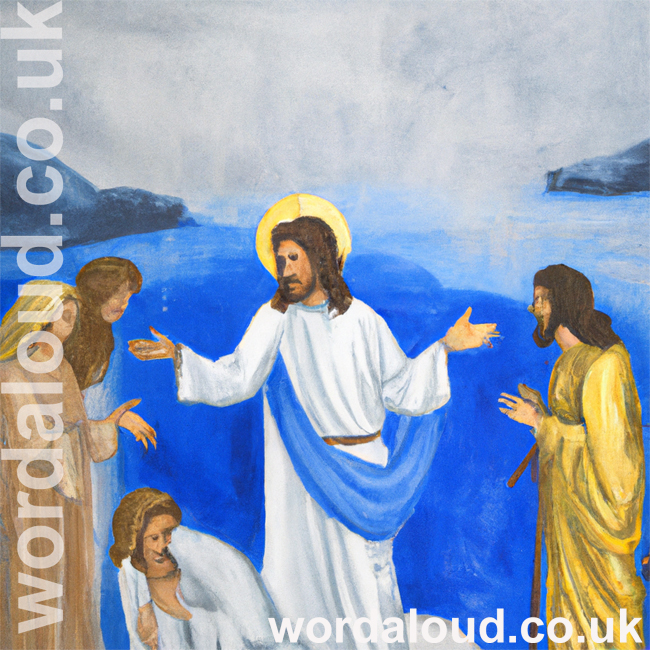Christian Art | Prayer With Jesus | Psalms | Waiting For Divine Redemption | De Profundis | King David As A Boy | Audio KJV | Love Revealed By Jesus Christ | King James Audio Bible
Psalm 130 | King James Audio Bible
YouTube: De Profundis | Psalm 130 KJV | King James Audio Bible Psalms
Psalm 130, one of fifteen Songs of Ascents, depicts profound depth of emotion and spiritual longing. This psalm emerges not from a place of superficial distress but from the depths of human experience, as the psalmist begins, ‘Out of the depths have I cried unto thee, O LORD.’
The initial verses set a tone of earnest supplication. ‘Lord, hear my voice: let thine ears be attentive to the voice of my supplications,’ the psalmist pleads, establishing a direct and personal dialogue with the Divine. This plea for attention is not just a call for divine intervention but also an expression of an intimate relationship with God, one that allows for such raw and direct communication.
The psalm acknowledges human fallibility and the divine attribute of forgiveness. ‘If thou, LORD, shouldest mark iniquities, O Lord, who shall stand?’ Here, the psalmist recognizes the inevitability of human sin and the impossibility of withstanding divine judgment without grace. This rhetorical question not only highlights human vulnerability but also initiates this revelation: ‘But there is forgiveness with thee, that thou mayest be feared.’ This verse is a profound statement of faith in God’s merciful nature, suggesting that reverence for God stems not from fear of punishment but from awe of His capacity to forgive.
The psalm transitions into a state of hopeful waiting and unwavering trust in the LORD. ‘I wait for the LORD, my soul doth wait, and in his word do I hope,’ declares the psalmist, indicating a shift from despair to anticipation. This waiting is not passive; it is an active, soulful anticipation grounded in the promises of God’s word.
This theme of waiting expands into a metaphor that captures the intensity of the psalmist’s hope. ‘My soul waiteth for the Lord more than they that watch for the morning: I say, more than they that watch for the morning.’ The repetition in this verse is deliberate, emphasizing the longing that exceeds even that of sentinels awaiting the break of day. It is a longing that speaks to a deep spiritual yearning, a desire for the light of God’s presence in the midst of darkness.
The psalm concludes with a universalization of this hope. ‘Let Israel hope in the LORD: for with the LORD there is mercy, and with him is plenteous redemption.’ Here, the individual’s plea transforms into a collective call for hope among the people of Israel. This verse encapsulates the central message of the psalm: the availability of divine mercy and redemption.
‘And he shall redeem Israel from all his iniquities.’ With this final verse, the psalmist affirms a confident belief in God’s power to redeem and cleanse from sin. It is a declaration of faith in the ultimate deliverance and restoration of Israel.

Psalm 130 | King James Audio Bible
Out of the depths have I cried unto thee, O LORD.
Lord, hear my voice: let thine ears be attentive to the voice of my supplications.
If thou, LORD, shouldest mark iniquities, O Lord, who shall stand?
But there is forgiveness with thee, that thou mayest be feared.
I wait for the LORD, my soul doth wait, and in his word do I hope.
My soul waiteth for the Lord more than they that watch for the morning: I say, more than they that watch for the morning.
Let Israel hope in the LORD: for with the LORD there is mercy, and with him is plenteous redemption.
And he shall redeem Israel from all his iniquities.

![]()
Psalm 130 | King James Audio Bible
- Human Frailty And Divine Forgiveness: Psalm 130 acknowledges human sinfulness and the necessity of divine forgiveness, as emphasized in the verse, ‘If thou, LORD, shouldest mark iniquities, O Lord, who shall stand?’ This theme portrays a profound understanding of human imperfection and the essential nature of God’s grace and mercy.
- Earnest Supplication And Intimate Dialogue With God: The psalmist’s plea, ‘Lord, hear my voice: let thine ears be attentive to the voice of my supplications,’ reflects a theme of earnest supplication and the establishment of an intimate, personal dialogue with the Divine. It underscores the psalmist’s deep yearning for a direct connection with God.
- The Anticipation And Power Of Hope: ‘I wait for the LORD, my soul doth wait, and in his word do I hope,’ conveys a theme of patient waiting and the sustaining power of hope based on God’s promises. It highlights the active nature of hope and the soul’s longing for divine intervention.
- Universal Call For Hope And Redemption: The psalm extends the personal plea to a communal level, urging collective hope in God’s mercy and redemption, as stated in ‘Let Israel hope in the LORD: for with the LORD there is mercy, and with him is plenteous redemption.’ This theme expands the message of hope and salvation to all of Israel.
- Confidence In Divine Deliverance: The psalm concludes with a strong affirmation of faith in God’s ability to redeem and cleanse from sin, ‘And he shall redeem Israel from all his iniquities.’ This theme embodies confidence in divine deliverance and the ultimate restoration of the faithful.
- Contrast Between Despair And Deliverance: Beginning with a cry from the depths of despair and moving towards a confident declaration of redemption, the psalm captures the contrast between human despair and divine deliverance. It highlights the transformative journey from anguish to assurance in God’s salvation.

Psalm 130 | King James Audio Bible
External resources:
Enduring Word Bible Commentary on Psalm 130
Matthew Henry’s Commentary on Psalm 130
Working Preacher Commentary on Psalm 130
Ray Fowler’s Commentary on Psalm 130
Coffman’s Commentaries on Psalm 130








